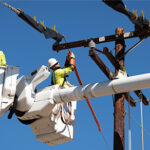Gov. Gavin Newsom directed urban water supplies (UWS) throughout the state to adopt certain policies by May 25, 2022, to reduce water usage during the drought.
Two of those guidelines are:
“• Urban water suppliers shall submit a draft annual water supply and demand assessment, as required in Water Code section 10632.1, by June 1, 2022. The final draft remains due on July 1, 2022.
“• Urban water suppliers shall activate their Water Shortage Contingency Plan (WSCP) Level 2 requirements (anticipating up to a 20% reduction in supplies), or an equivalent standard if there is no adopted WSCP, by a date to be determined by the Water Board. CEQA requirements for projects relating to implementing WSCP Level 2 requirements are suspended.”
The Idyllwild Water District (IWD) attorney at the directors’ June 15 meeting, Ryan Guiboa of Best Best & Krieger out of Ontario, told the board that it does not have to follow the state water conservation policies being put into place due to drought because it does not qualify as an urban water supplier.
He said a UWS requires 3,000 accounts or uses 3,000-acre-feet of water annually, of which IWD has neither.
IWD General Manager Leo Havener, when later asked, agreed with the attorney on his approach to the state water policies. He had been resistant for many months to put IWD into Stage 2 from Stage 1 but finally did June 1.
“Finally, the Order encourages more stringent conservation on a voluntary basis, e.g., activation of WSCP Level 3, anticipating shortage levels of up to 30%. It also encourages all Californians to limit their summertime water use and generally use water more efficiently both indoors and out,” according to the order.
Fern Valley Water District (FVWD) General Manager Victor Jimenez told his board recently that customers soon will be limited to outdoor watering two days a week, even though it is a smaller district than IWD, and it is following the state policies. FVWD is in Stage 3. Pine Cove Water District (PCWD) is in Stage 2.
PCWD General Manager Jeremy Potter did not respond to the question by press time.
When asked why he follows stage policy, Jimenez said, “Although we technically are not Urban Water Suppliers individually, as ‘the Hill,’ we would be and I personally have found that the more that we do to comply with what is required of everyone else, the better the chance that they won’t come after us to implement official revised water shortage contingency plans and that type of thing, which are costly to produce and implement …
“The order allows for watering of trees and plants, and was more directed at turf, so I don’t think that it is asking too much of our customers to do their part when all of the flatlanders are being forced to lose their lawns with the new order.
“Technically if we wanted to play the ‘we aren’t urban water suppliers’ card, we could, but that could also result in a redefining of ‘urban water supplier’ to include everyone, which could be very costly for all of us.
“The fact that we fly under the radar on a lot of the regulations, not necessarily water quality related, but costly ‘plans and regulations’ that are required of urban water suppliers to establish, while we are not required to, prompts me to comply with whatever no cost requirements we can implement, to avoid catching their attention and causing them to take a closer look and decide to revisit the urban water supplier threshold and redefine it to include us.”










